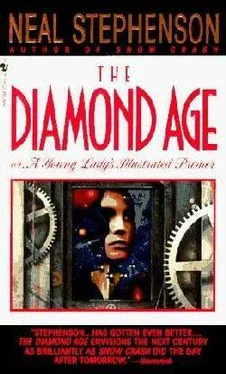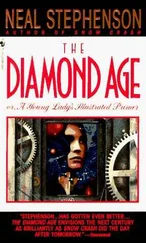Нил Стивенсон - Diamond Age
Здесь есть возможность читать онлайн «Нил Стивенсон - Diamond Age» весь текст электронной книги совершенно бесплатно (целиком полную версию без сокращений). В некоторых случаях можно слушать аудио, скачать через торрент в формате fb2 и присутствует краткое содержание. Жанр: Киберпанк, на английском языке. Описание произведения, (предисловие) а так же отзывы посетителей доступны на портале библиотеки ЛибКат.
- Название:Diamond Age
- Автор:
- Жанр:
- Год:неизвестен
- ISBN:нет данных
- Рейтинг книги:3 / 5. Голосов: 1
-
Избранное:Добавить в избранное
- Отзывы:
-
Ваша оценка:
- 60
- 1
- 2
- 3
- 4
- 5
Diamond Age: краткое содержание, описание и аннотация
Предлагаем к чтению аннотацию, описание, краткое содержание или предисловие (зависит от того, что написал сам автор книги «Diamond Age»). Если вы не нашли необходимую информацию о книге — напишите в комментариях, мы постараемся отыскать её.
Diamond Age — читать онлайн бесплатно полную книгу (весь текст) целиком
Ниже представлен текст книги, разбитый по страницам. Система сохранения места последней прочитанной страницы, позволяет с удобством читать онлайн бесплатно книгу «Diamond Age», без необходимости каждый раз заново искать на чём Вы остановились. Поставьте закладку, и сможете в любой момент перейти на страницу, на которой закончили чтение.
Интервал:
Закладка:
"I know," Bud said, "I been checking this thing out." Then, to the gun, "Disperse ten, medium pattern." Then he said "hut" again. His head snapped back much harder, and ten POPs went off at once, all over the mannikin's body and the wall behind it. The room was getting smoky now, starting to smell like burned plastic.
"You can disperse up to a hundred," the guy said, "but the recoil'd probably break your neck."
"I think I got it down," Bud said, "so load me up. First magazine with electrostun rounds. Second magazine with Cripplers. Third with Hellfires. And get me some fucking aspirin."
Source Victoria;
description of its environs.
Source Victoria's air intakes erupted from the summit of the Royal Ecological Conservatory like a spray of hundred-meter-long calla lilies. Below, the analogy was perfected by an inverted tree of rootlike plumbing that spread fractally through the diamondoid bedrock of New Chusan, terminating in the warm water of the South China Sea as numberless capillaries arranged in a belt around the smartcoral reef, several dozen nieters beneath the surface. One big huge pipe gulping up seawater would have done roughly the same thing, just as the lilies could have been replaced by one howling maw, birds and litter whacking into a bloody grid somewhere before they could gum up the works.
But it wouldn't have been ecological. The geotects of Imperial Tectonics would not have known an ecosystem if they'd been living in the middle of one. But they did know that ecosystems were especially tiresome when they got fubared, so they protected the environment with the same implacable, plodding, green-visored mentality that they applied to designing overpasses and culverts. Thus, water seeped into Source Victoria through microtubes, much the same way it seeped into a beach, and air wafted into it silently down the artfully skewed exponential horns of those thrusting calla lilies, each horn a point in parameter space not awfully far from some central ideal. They were strong enough to withstand typhoons but flexible enough to rustle in a breeze. Birds, wandering inside, sensed a gradient in the air, pulling them down into night, and simply chose to fly out. They didn't even get scared enough to shit.
The lilies sprouted from a stadium-sized cut-crystal vase, the Diamond Palace, which was open to the public. Tourists, aerobicizing pensioners, and ranks of uniformed schoolchildren marched through it year in and year out, peering through walls of glass (actually solid diamond, which was cheaper) at various phases of the molecular disassembly line that was Source Victoria. Dirty air and dirty water came in and pooled in tanks. Next to each tank was another tank containing slightly cleaner air or cleaner water. Repeat several dozen times. The tanks at the end were filled with perfectly clean nitrogen gas and perfectly clean water.
The line of tanks was referred to as a cascade, a rather abstract bit of engineer's whimsy lost on the tourists who did not see anything snapshot-worthy there. All the action took place in the walls separating the tanks, which were not really walls but nearly infinite grids of submicroscopic wheels, ever-rotating and many-spoked. Each spoke grabbed a nitrogen or water molecule on the dirty side and released it after spinning around to the clean side. Things that weren't nitrogen or water didn't get grabbed, hence didn't make it through. There were also wheels for grabbing handy trace elements like carbon, sulfur, and phosphorus; these were passed along smaller, parallel cascades until they were also perfectly pure. The immaculate molecules wound up in reservoirs. Some of them got combined with others to make simple but handy molecular widgets. In the end, all of them were funneled into a bundle of molecular conveyor belts known as the Feed, of which Source Victoria, and the other half-dozen Sources of Atlantis/Shanghai, were the fountainheads.
Financial complications of Bud's lifestyle;
visit to a banker.
Bud surprised himself with how long he went before he had to use the skull gun in anger. Just knowing it was in there gave him such an attitude that no one in his right mind would Rick with him, especially when they saw his Sights and the black leather. He got his way just by giving people the evil eye.
It was time to move up the ladder. He sought work as a lookout. It wasn't easy. The alternative pharmaceuticals industry ran on a start, just-in-time delivery system, keeping inventories low so that there was never much evidence for the cops to seize. The stuff was grown in illicit matter compilers, squirreled away in vacant low-rent housing blocks, and carried by the runners to the actual street dealers. Meanwhile, a cloud of lookouts and decoys circulated probabilistically through the neighborhood, never stopping long enough to be picked up for loitering, monitoring the approach of cops (or cops' surveillance pods) through huds in their sunglasses.
When Bud told his last boss to go Rick himself, he'd been pretty sure he could get a runner job. But it hadn't panned out, and since then a couple more big airships had come in from North America and disgorged thousands of white and black trash into the job market. Now Bud was running out of money and getting tired of eating the free food from the public matter compilers.
The Peacock Bank was a handsome man with a salt-and-pepper goatee, smelling of citrus and wearing an exceedingly snappy doublebreasted suit that displayed his narrow waist to good effect. He was to be found in a rather seedy office upstairs of a travel agency in one of the lurid blocks between the Aerodrome and the brothel-lined waterfront.
The banker didn't say much after they shook hands, just crossed his arms pensively and leaned back against the edge of his desk. In this attitude he listened to Bud's freshly composed prevarication, nodding from time to time as though Bud had said something significant. This was a little disconcerting since Bud knew it was all horseshit, but he had heard that these dotheads prided themselves on customer service.
At no particular point in the monologue, the banker cut Bud off simply by looking up at him brightly. "You wish to secure a line ofcredit," he said, as if he were pleasantly surprised, which was not terribly likely.
"I guess you could say that," Bud allowed, wishing he'd known to put it in such fine-sounding terminology.
The banker reached inside his jacket and withdrew a piece of paper, folded in thirds, from his breast pocket. "You may wish to peruse this brochure," he said to Bud, and to the brochure itself he rattled off something in an unfamiliar tongue. As Bud took it from the banker's hand, the blank page generated a nice animated color logo and music. The logo developed into a peacock. Beneath it, a video presentation commenced, hosted by a similar-looking gent— sort of Indian looking but sort of Arab too. "'The Parsis welcome you to Peacock Bank,'" he said.
"What's a Parsi?" Bud said to the banker, who merely lowered his eyelids one click and jutted his goatee at the piece of paper, which had picked up on his question and already branched into an explanation. Bud ended up regretting having asked, because the answer turned out to be a great deal of general hoo-ha about these Parsis, who evidently wanted to make very sure no one mistook them for dotheads or Pakis or Arabs— not that they had any problem with those very fine ethnic groups, mind you. As hard as he tried not to pay attention, Bud absorbed more than he wanted to know about the Parsis, their oddball religion, their tendency to wander around, even their fucking cuisine, which looked weird but made. his mouth water anyway. Then the brochure got back to the business at hand, which was lines of credit.
Bud had seen this all before. The Peacock Bank was running the same racket as all the others: If they accepted you, they'd shoot the credit card right into you, then and there, on the spot. These guys implanted it in the iliac crest of the pelvis, some opted for the mastoid bone in the skull-anywhere a big bone was close to the surface. A bone mount was needed because the card had to talk on the radio, which meant it needed an antenna long enough to hear radio waves. Then you could go around and buy stuff just by asking for it; Peacock Bank and the merchant you were buying from and the card in your pelvis handled all the details.
Читать дальшеИнтервал:
Закладка:
Похожие книги на «Diamond Age»
Представляем Вашему вниманию похожие книги на «Diamond Age» списком для выбора. Мы отобрали схожую по названию и смыслу литературу в надежде предоставить читателям больше вариантов отыскать новые, интересные, ещё непрочитанные произведения.
Обсуждение, отзывы о книге «Diamond Age» и просто собственные мнения читателей. Оставьте ваши комментарии, напишите, что Вы думаете о произведении, его смысле или главных героях. Укажите что конкретно понравилось, а что нет, и почему Вы так считаете.

![Нил Стивенсон - Криптономикон [litres]](/books/23868/nil-stivenson-kriptonomikon-litres-thumb.webp)







![Нил Стивенсон - Лавина [litres с оптимизированной обложкой]](/books/414066/nil-stivenson-lavina-litres-s-optimizirovannoj-ob-thumb.webp)
